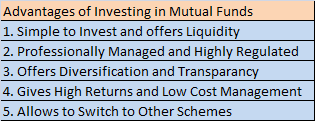Eagar to know about mutual funds Vs bonds before investing? Let’s understand it.
You can invest in mutual funds, bonds, stocks, and many other financial instruments. They always come with high risk but also with high returns in long term. So, let’s understand mutual funds vs bonds.
Bonds are debt securities issued by corporate or governmental entities that repay the face value of the bond at maturity. Investors who buy the bonds are loaning money to the issuer and are therefore entitled to the repayment at maturity, as well as regular coupon payments throughout the life of the bond.
Mutual funds are a type of investment made up of a pool of funds from many investors. The money that is invested in a mutual fund is typically used to purchase a collection of investments, such as stocks, bonds, money market instruments, and other securities.
What is a bond?
A bond is a fixed-income financial security issued by corporations, governments, and other entities to raise capital. Bonds are generally considered to be a safe investment and are used by investors to spread risk and diversify their portfolios.
Types of Bonds:
Government securities
Government securities (also known as government bonds or G-Secs) are debt instruments issued by the government of a country to raise funds from public and private investors.
Corporate bond
A corporate bond is a debt security that is issued by a corporation and sold to investors. Corporate bonds are issued for a variety of purposes, such as to raise capital for business expansion or to refinance existing debts.
Public sector
Public sector bonds are debt securities issued by the government at the federal, provincial, and municipal levels. They are typically issued to raise capital and fund public projects such as infrastructure, schools, and hospitals.
Sovereign Gold Bonds
Sovereign Gold Bonds (SGBs) are government securities. They are substitutes for holding physical gold. Investors can invest in SGBs which are issued by the Reserve Bank India on behalf of the Government of India. The Bonds provide an alternative for investors to invest in gold, with the benefits of liquidity and safety.
Advantages of investing in Bonds
Investing in Bonds offers many advantages like low risk and regular income. It’s another way to diversify your portfolio. Depending on the type of bond you purchase, the interest you receive may be exempt from state or local taxes. There are other benefits as well. Let’s have a look.

What is a Mutual Fund?
A mutual fund is an investment managed by a professional money manager that pools funds from many investors to purchase a diversified portfolio of securities, such as stocks, bonds, and money market instruments. Investors receive a share of the profits or losses of the fund and can withdraw their money at any time. Mutual funds are typically more diversified, more liquid, and have lower fees than other types of investments.
Types of Mutual Funds
Equity funds are funds that invest mainly in stocks. They are designed to grow over the long term as the stock market grows.
Bond funds are funds that invest primarily in fixed-income investments such as bonds. Bonds are usually issued by governments and other entities for a specific amount. Bond funds are designed to provide a steady return with low risk.
Hybrid funds are a combination of equity and bond funds. They provide a combination of both stock and bond investments. These funds are designed to offer a balance of both capital appreciation and income. Hybrid funds can provide diversification across multiple asset classes and reduce risk.
Advantages of investing in Mutual Funds
Low cost, diversified portfolios, professional money management, access to specialized investments, and potential for higher returns than other investment options. There are other benefits of investing in a mutual fund. Let’s know them quickly.

Bonds vs Mutual Funds

Concluding thoughts
Investing your precious money is always a wise decision. But you should be aware of how to invest that hard earn money wisely. When choosing between mutual funds and bonds, it’s important to carefully ponder the pros and cons of each before making a decision.
Mutual funds offer the potential for greater returns than bonds, but they also come with greater risks and can be more volatile than bonds. Bonds, on the other hand, offer greater security, but their returns are generally lower than those of mutual funds. Ultimately, the decision should be based on your own individual risk tolerance and goals.
FAQS
How to invest in debt funds?
- Research the debt fund in which you want to invest based on several parameters.
- Then choose the debt fund that best meets your investment goals and time horizon.
- Invest in the chosen debt fund by setting up an account with the fund manager or through an online broker.
- Monitor your investments and make changes to your holdings as needed.
What are short-term debt funds?
Short-term debt funds are mutual funds that invest in a variety of fixed-income securities with a shorter duration or maturity date than long-term debt funds. These funds invest in securities such as Treasury bills, government bonds, corporate bonds, and money market instruments.
Are bonds safer than mutual funds?
It depends. Mutual funds are generally considered to be relatively safe investments, but they do come with some risks. Bonds are generally considered to be safer than mutual funds, as they tend to have a lower level of volatility and their rates of return are more predictable.
What are the risks involved with mutual funds?
As with any investment in the financial instrument is subject to risk, meaning the value of the fund can fluctuate due to many external factors. Risks involved in Mutual funds are dependent on Market Risk, Interest Rate Risk, Credit Risk, Liquidity Risk, Investment Strategy Risk, and others.
What are the risks of bonds?
Investing in bonds brings along the following risks:
- Interest Rate Risk
- Credit Risk
- Inflation Risk
- Liquidity Risk





